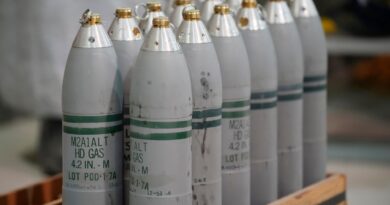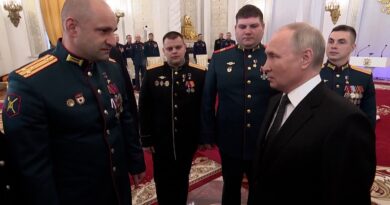A pro-Russian tide in Slovakia could threaten Europe’s unity on Ukraine
Inside a massive arms factory in Dubnica, Slovakia, workers painstakingly insert fuses into the tips of 155-millimeter artillery shells, which are in high demand for Ukraine’s ongoing war. However, these deliveries have become a source of division in the town, with growing objections from locals like Samuel Prekop, 19, who believes it only adds fuel to the flames.
Fueling the polarization across Slovakia is Robert Fico, a socially conservative left-wing populist and former prime minister, who has surged in the polls once again. Fico promises to end military aid to Ukraine and veto European Union sanctions on Russia, which could further weaken the EU’s political unity in the face of Russian aggression and challenge its democratic ideals.
Fico, who previously left office following the murder of a journalist investigating his finances, is benefiting from Slovakia’s political turmoil. The country’s pro-Ukrainian governing coalition faced criticism for its handling of the pandemic and collapsed in December. Trust in state institutions is low, contributing to the erosion of support for Ukraine, as the contributions are associated with the unpopular leadership.
President Zuzana Caputova and her allies argue that a Russian disinformation campaign has taken root, amplified by Fico and other opposition politicians. Slovakia’s skepticism regarding Ukraine is reflected in polls, with a declining belief that Russia bears primary responsibility for the war. Fico has compared a NATO battlegroup in Slovakia to Nazi soldiers and portrayed the conflict in Ukraine as a confrontation between the United States and Russia.
A Fico comeback would concern the EU, as he might align with Hungarian President Viktor Orban in obstructing aid for Ukraine and blocking sanctions on Russia. The lack of unity among European allies could be exploited by Moscow. However, Fico’s return to power is uncertain, and the formation of a governing coalition would be necessary.
Slovakia is currently ramping up arms production to meet the demands of the war, planning to increase the production of 155-mm artillery shells fivefold in the next two years. As the country’s political landscape remains fragmented, it remains to be seen how much of Fico’s rhetoric against NATO and arming Ukraine would hold if he were to regain power.
While Fico’s party claims it would continue Slovakia’s NATO membership, the evaluation of sanctions and military support for Ukraine would depend on their effectiveness and economic impact. The focus of the future government, regardless of its composition, is expected to be primarily domestic.
The situation in Slovakia reflects the complexities and divisions surrounding arms production, foreign policy, and political alignments in the context of regional conflicts.




